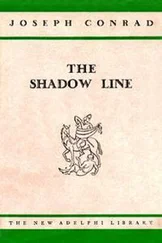"Very well, and you are extraordinary, too. That's understood—here we are both under that curse and having to face together whatever may turn up. But who on earth could have sent you this writing?"
"Who?" repeated Lingard. "Why, that young fellow that blundered on my brig in the dark, bringing a boatload of trouble alongside on that quiet night in Carimata Straits. The darkest night I have ever known. An accursed night."
Mrs. Travers bit her lip, waited a little, then asked quietly:
"What difficulty has he got into now?"
"Difficulty!" cried Lingard. "He is immensely pleased with himself, the young fool. You know, when you sent him to talk to me that evening you left the yacht, he came with a loaded pistol in his pocket. And now he has gone and done it."
"Done it?" repeated Mrs. Travers blankly. "Done what?"
She snatched from Lingard's unresisting palm the sheet of paper. While she was smoothing it Lingard moved round and stood close at her elbow. She ran quickly over the first lines, then her eyes steadied. At the end she drew a quick breath and looked up at Lingard. Their faces had never been so close together before and Mrs. Travers had a surprising second of a perfectly new sensation. She looked away.—"Do you understand what this news means?" he murmured. Mrs. Travers let her hand fall by her side. "Yes," she said in a low tone. "The compact is broken."
Carter had begun his letter without any preliminaries:
You cleared out in the middle of the night and took the lady away with you. You left me no proper orders. But as a sailorman I looked upon myself as left in charge of two ships while within half a mile on that sandbank there were more than a hundred piratical cut-throats watching me as closely as so many tigers about to leap. Days went by without a word of you or the lady. To leave the ships outside and go inland to look for you was not to be thought of with all those pirates within springing distance. Put yourself in my place. Can't you imagine my anxiety, my sleepless nights? Each night worse than the night before. And still no word from you. I couldn't sit still and worry my head off about things I couldn't understand. I am a sailorman. My first duty was to the ships. I had to put an end to this impossible situation and I hope you will agree that I have done it in a seamanlike way. One misty morning I moved the brig nearer the sandbank and directly the mist cleared I opened fire on the praus of those savages which were anchored in the channel. We aimed wide at first to give those vagabonds that were on board a chance to clear out and join their friends camped on the sands. I didn't want to kill people. Then we got the long gun to bear and in about an hour we had the bottom knocked out of the two praus. The savages on the bank howled and screamed at every shot. They are mighty angry but I don't care for their anger now, for by sinking their praus I have made them as harmless as a flock of lambs. They needn't starve on their sandbank because they have two or three dugouts hauled up on the sand and they may ferry themselves and their women to the mainland whenever they like.
I fancy I have acted as a seaman and as a seaman I intend to go on acting. Now I have made the ships safe I shall set about without loss of time trying to get the yacht off the mud. When that's done I shall arm the boats and proceed inshore to look for you and the yacht's gentry, and shan't rest till I know whether any or all of you are above the earth yet.
I hope these words will reach you. Just as we had done the business of those praus the man you sent off that night in Carimata to stop our chief officer came sailing in from the west with our first gig in tow and the boat's crew all well. Your serang tells me he is a most trustworthy messenger and that his name is Jaffir. He seems only too anxious to try to get to you as soon as possible. I repeat, ships and men have been made safe and I don't mean to give you up dead or alive.
"You are quick in taking the point," said Lingard in a dull voice, while Mrs. Travers, with the sheet of paper gripped in her hand, looked into his face with anxious eyes. "He has been smart and no mistake."
"He didn't know," murmured Mrs. Travers.
"No, he didn't know. But could I take everybody into my confidence?" protested Lingard in the same low tone. "And yet who else could I trust? It seemed to me that he must have understood without being told. But he is too young. He may well be proud according to his lights. He has done that job outside very smartly—damn his smartness! And here we are with all our lives depending on my word—which is broken now, Mrs. Travers. It is broken."
Mrs. Travers nodded at him slightly.
"They would sooner have expected to see the sun and the moon fall out of the sky," Lingard continued with repressed fire. Next moment it seemed to have gone out of him and Mrs. Travers heard him mutter a disconnected phrase. . . . "The world down about my ears."
"What will you do?" she whispered.
"What will I do?" repeated Lingard, gently. "Oh, yes—do. Mrs. Travers, do you see that I am nothing now? Just nothing."
He had lost himself in the contemplation of her face turned to him with an expression of awed curiosity. The shock of the world coming down about his ears in consequence of Carter's smartness was so terrific that it had dulled his sensibilities in the manner of a great pain or of a great catastrophe. What was there to look at but that woman's face, in a world which had lost its consistency, its shape, and its promises in a moment?
Mrs. Travers looked away. She understood that she had put to Lingard an impossible question. What was presenting itself to her as a problem was to that man a crisis of feeling. Obviously Carter's action had broken the compact entered into with Daman, and she was intelligent enough to understand that it was the sort of thing that could not be explained away. It wasn't horror that she felt, but a sort of consternation, something like the discomfiture of people who have just missed their train. It was only more intense. The real dismay had yet to make its way into her comprehension. To Lingard it was a blow struck straight at his heart.
He was not angry with Carter. The fellow had acted like a seaman. Carter's concern was for the ships. In this fatality Carter was a mere incident. The real cause of the disaster was somewhere else, was other, and more remote. And at the same time Lingard could not defend himself from a feeling that it was in himself, too, somewhere in the unexplored depths of his nature, something fatal and unavoidable. He muttered to himself:
"No. I am not a lucky man."
This was but a feeble expression of the discovery of the truth that suddenly had come home to him as if driven into his breast by a revealing power which had decided that this was to be the end of his fling. But he was not the man to give himself up to the examination of his own sensations. His natural impulse was to grapple with the circumstances and that was what he was trying to do; but he missed now that sense of mastery which is half the battle. Conflict of some sort was the very essence of his life. But this was something he had never known before. This was a conflict within himself. He had to face unsuspected powers, foes that he could not go out to meet at the gate. They were within, as though he had been betrayed by somebody, by some secret enemy. He was ready to look round for that subtle traitor. A sort of blankness fell on his mind and he suddenly thought: "Why! It's myself."
Immediately afterward he had a clear, merciless recollection of Hassim and Immada. He saw them far off beyond the forests. Oh, yes, they existed—within his breast!
"That was a night!" he muttered, looking straight at Mrs. Travers. He had been looking at her all the time. His glance had held her under a spell, but for a whole interminable minute he had not been aware of her at all. At the murmur of his words she made a slight movement and he saw her again.—"What night?" she whispered, timidly, like an intruder. She was astonished to see him smile.—"Not like this one," he said. "You made me notice how quiet and still it was. Yes. Listen how still it is."
Читать дальше












